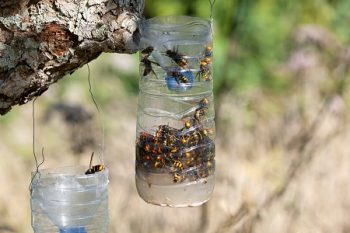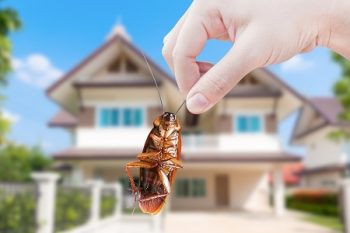No one wants to call an exterminator on first sight of a house pest. Most people will exhaust the usual suspect products to prevent an infestation. But keeping pests out of your home requires more than single use traps, it will involve denying them access, keeping a clean abode and using a bug’s own weaknesses against them.
As Phoenix’s trusted pest control experts, Anteater Exterminators have a few tricks up our sleeve to share with homeowners. If you are struggling with home invaders, consider our tips to gain the upper hand over the creepy crawlies and flying insects invading your Phoenix home. Bare in mind many of these tactics should be used in concert with each other and not just as single solutions. Altogether these tips will create an environment hostile to pests and attractive to friends. 

Seal Cracks and Gaps
You will need to identify gaps and cracks in and outside your home. Blocking, booby trapping and generally walling these tiny entrances with physical and chemical walls will discourage even the most persistent pest.
Check Doors and Windows
Doorways and window sills often provide the most direct access to the home. Installing door seal kits and window screens on every possible portal into the home is paramount when impeding insects from entering the building.
Inspect The Perimeter
It’s not just interior gaps that need inspection, search for gaps around the exterior of your home. Sections of siding and cracks in foundations can develop small fractures. These exterior gaps provide inconspicuous entry points for the intrepid insect as well as an ideal nesting ground that remains out of sight and out of mind of the homeowner. Use foam insulation to seal up foundation cracks and loose siding as well as flood out annoying pests commandeering your own home against you.
Homemade Pest Repellents And Traps
There’s more you can do than transforming home into a hermetically sealed bubble. There are homemade ingredients you can make and use for natural pest repellents. Of course, there are as many bugs as there are colours under the Phoenix sun which means there’s a lot of different repellents. Combining these organic mixtures with insulation not only blocks the entrance off physically, but also imbues it with an unpleasant scent.

Vinegar Spray
Mixing a 50/50 split of water and vinegar infused with citrus peels is a certified termite and ant killer. It also has the added benefit of wiping away the chemical trail ants and termites leave to guide their brethren to the food. One spray and these colonizers will take note: do not enter here. As an added bonus: spiders and scorpions also hate the scent of vinegar and will not tolerate it when sprayed. Use this to ward off scorpions in your home.
Borax Traps
If you want to kill an ant colony, we recommend a borax and honey/syrup for a deadly gourmet smorgasbord. The borax wreaks havoc on an ant’s digestive system and the more borax they bring back to the colony, the more destruction they unwittingly sow. Cucumber slices in vinegar will also work to repel ants, although it will not necessarily kill.
Plant Repellents
While eradicating the mosquito has long been a question scientists have pondered (and a paradise many of us probably dream), there are also natural methods to repel this odious insect. To vex nature’s most vexing pest, we recommend keeping rosemary, sage or lavender plants. These aromatic plants will irritate mosquitos and help mask the scents they follow to find hosts for feeding.
Wasp Traps
Wasp, yellow jacket and hornet traps can be homemade and super effective. People usually use soda bottles or milk jugs, baited with raw meat, jam or fruit peels on a string and filled two thirds of the way with water, beer and some soap. The idea is to make a one way entrance irresistible to waspkind. Once inside, the struggle to escape will have them falling into the liquid and drowning.
Use the Right Light Bulbs
Everyone has seen the hypnotic effects of lights on a moth, if not the husk of many a dead insect who flew too close to the zap. But did you know that changing your lights can not only save power but deter bugs them from approaching your home? Changing your light bulbs uses a bug’s own sense of sight against them. As Dodson Pest Control in Virginia explains, insects have a reduced light spectrum compared to humans. They can only see ultraviolet, blue and green lights, meaning other colors are highly undesirable.
Bulbs using mercury vapor give off a “cool white” glow similar to moonlight making them highly attractive to insects. However, halogen bulbs emitting sodium vapor with a pink, yellow, or orange glow appear similar to daylight, a deterrent for night flying insects.
Minimize Plants and Mulch
Keeping a clean garden and tip-top lawn shape can keep pest invasions at bay. Long grasses and plenty of underbrush present an ideal environment for creepy crawlies to nest and hide. If the backyard is left to its own devices, soon the outside come into conflict with the entire exterior. Bugs and serpents will be able to gauge your property for access to food without exposing themselves too much.
Dispose of grass clippings and other yard debris in the proper bin rather than in the trash. Putting yard debris in the trash gives any pests hiding in the debris direct access to food waste and a viable breeding ground. By keeping them separate, bugs and crawlers won’t have that chance.
Another way to keep your garden clear is to install bird feeder system around the siding of your home. Attracting plenty of nature’s best pest control can reduce the population of certain insects including, flies, mosquitos, wasps and other flying insects.

Regularly Clean Your Home
Sometimes it’s just all about upkeep. Cleaning your space of living on a regular basis means any unwanted pests are going to have to travel far and wide to find some forgotten tidbit. Aside from vacuuming, sweeping, mopping and wiping away any and all crumbs, spills and stains, there are other things you can do to run a tight ship and deny any pests easy food.
Properly Secure Food Storage
Keep your means ingredients locked tight in the pantry spaces and refrigerators of your home. Air tight food containers are a must when keeping food fresh for your consumption and not someone else’s.
Properly Dispose of Trash and Litter
Keeping trash can lids sealed or otherwise stored away from open access denies another important hotspot to ants. Waste bins represent a repository of food crumbs still potable for ants and other insects who forage and then breakdown the food they find away from home. Ants are industrious creatures and will exploit any potential food source that they can find. Keeping a tight seal on your waste denies them a reliable trail to follow.
Clean Dishes, Recyclables and Drains
Unwashed dishes can become major potential food sources for even the tiniest pest. Dishes should be washed thoroughly to prevent bacteria and pests. Moreover, one dish everyone forgets about is the pet food dish. Keeping a clean bowl of food for your pet is paramount to them enjoying a full meal and refusing pests another reason to invade your home.
People often forget to rinse their used recyclables. Not only do insufficiently cleaned glasses, plastics and metals see rejection for recycling, they also can create another reservoir of food crumbs for the unwanted to scavenge. Most recycling bins are open air and should be emptied regularly in order to avoid accumulating enough nourishment for unwanted pests to warrant return trips.
Fed Up With Pests? Anteater Exterminating Is Here To Help
Sometimes the stress of consistent critter and bug invasions are too much to handle and the goal is no longer limited to warding or deterring bugs, but getting them gone. Anteater Exterminating can help homeowners like you do just that. Our technicians are the pest control experts for the Phoenix area trained to handle any extermination or control project in the metro. If you have troubles with any insect, spider, scorpion or other pest in your home then call us today and suffer no longer.

